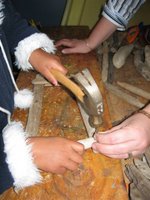Monday, May 29, 2006
Sunday, May 28, 2006
This is not a definitive list, just a selection that we have purchased for schools because we feel they provide great ideas for Discovery Time.
From Horowitz publishing
Hamburger
Let's make pancakes
Magic tricks
Making a picture
Making a torch
Making bread
Making butter
Making dips
Making music
Making spaghetti
Milk shake
Shadow puppets
The school news
Treasure hunt
From Nelson Price Milburn publishers
Bees in the garden
Dinosaur
Growing peas
Ladybird ladybird
Making a bird
Making a cat & mouse
Making a rabbit
Making a toy house
Making breakfast
Making lunch
Making party food
My noodle necklace
Our butterflies
Thursday, May 18, 2006
I visited a year one class at Windley School and saw an amazing Discovery Time with a focus on photography. It had began with the teacher taking photos of each student and then progressed into:
making their own cameras
constructing photo frames
setting up a photo shop
There were of course other DT activities going on at the same time but these three activities provided a focus.

The photo frames - made out of driftwood involved some good carpentry skills and the children soon discovered that some pieces were softer than others - lots of great vocabulary extension work going on around the table.
These activities continued over several Friday sessions. They were hugely successful, yet quite simple to organise.
Thursday, May 11, 2006
Dig in
Elastics
Fun with shadows
Jacks
Let's make music
Let's Play
Magnets
Make a house
Make a mobile
Making a milkshake
Making blueberry muffins
Marbles
Paper planes
Skipping games
String games
What is it?
Wednesday, May 03, 2006
Michael Fielding is from the University of Sussex in the UK and is Director for Innovation Education .
He strongly believes that we should be involving students in their own learning and that listening to and valuing childrens' voices has to be a priority for classes of the future. He says that in order to do this teachers need to take on a facilitating role!!!!
So, all you teachers out there doing Discovery Time you are right on target!
This interview is 18 minutes long and can be heard on www.radionzco.nz
Bring up the web page, go to live audio streaming, then nine to noon, select Tues, 02 May.
If you left click you can listen to it
If you right click you can save it with - save target as (and then listen to it later)
These are their thoughts on the role of the teacher in Discovery Time
A facilitator
Helping children extend themselves
Helping children take responsibility for their own learning.
Setting up situations where learning can happen
Setting a safe secure environment so that children feel they can take risks
Setting rules and boundaries for listening & speaking, so that children feel safe.
Organising the room so that children can access equipment and work independently
A prompter of ideas – asking open ended questions
What might happen if…?
Can you try that another way?
Where do we go next?
Why did you do it like that?
Tell me about it?
What are you going to need next?
How do you think it will work?
What do you think might happen if…?
I’d like to do that. What do I have to do?
An observer
Notice successes
Notice strengths and weaknesses
Notice different personalities
Notice different interactions
Gather information for further planning
Gather information for meeting individual specific needs
A role model
Model specific behaviours that you want to target – looking after equipment, sharing, taking turns etc
A participator
Joining in as one of the kids rather than as the teacher
A listener
Taking time to really hear what children are saying
Thank you to Jamie, Shona, Marion, Bev, Kylie and Vanessa for this valuable contribution.